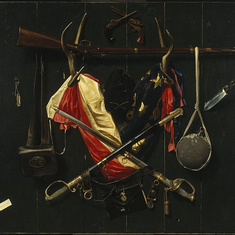
Songs of the Civil War, Part 1: Union Songs
First published: Wednesday September 28th, 2022
Report this blog
The Civil War – it was the deadliest conflict in American history, claiming more than one million lives over a span of four years, and it has left a tremendous impact on not only the nation, but the entire world. Now, just as with all important events, dozens upon dozens of songs were written about the war; and here are some of the famous and consistently popular. I do hope you enjoy reading!
The Battle Hymn of the Republic
Starting off this list is the Battle Hymn of the Republic. Perhaps the most famous song of the war, it was written by Julia Ward Howe who, disapproving of the "inappropriate" lyrics of John Brown's Body, sought out to write a set of more spiritual and inspiring lyrics for the tune. The lyrics apparently came to Mrs. Howe in a dream in November 1861, who immediately got out of bed as to not forget them. It was then published in Atlantic Monthly in February 1862.
Listen to Thomas Pyle's rendition here.

John Brown's Body
Serving as inspiration for the song above, John Brown's Body was created by soldiers looking to pass the time. Noticing a Scotsman in their battalion shared a name with famous abolitionist, John Brown, they borrowed the tune of "Say, Brothers" and wrote a few lines honoring him and his cause. The song's popularity exploded with Union soldiers, and today the tune serves as inspiration for dozens of songs around the world.
Listen to Paul Robeson's rendition here.

When Johhny Comes Marching Home
When Johnny Comes Marching Home is another famous Civil War song (though I suppose that's rather obvious seeing as it's on this list). It expresses a longing for the return of friends and family fighting in the war. It was written by Irishman Patrick Gilmore in 1863, published under the pseudonym Louis Lambert. It is said that Gilmore wrote it out for his sister Annie, who herself had a fiance out fighting in the war.
Listen to the Smith Brothers' rendition here.

Battle Cry of Freedom
The Battle Cry of Freedom was written by George Fredrick Root, considered the most prolific lyricist of the war (supposedly, he wrote over thirty songs). Published in 1862, it became so popular that publishers could not keep up with demand. It even became so popular that the Confederates adopted a version with modified lyrics. Additionally, it was used in the 1864 election as the "theme" of the Lincoln-Johnson ticket.
Listen to John Williams' rendition here.

When this Cruel War is Over
When this Cruel War is Over, also known as "Weeping, Sad and Lonely," was sung by both Union and Confederate soldiers. It was written in 1863 by Henry Tucker and is likely the most popular sad song of the war. It describes the mournful feeling of young men being sent off to the war, the bitter death and a longing to return back home. The song was banned at some camps because officers feared it would arouse thoughts of desertion.
Listen to the Gettysburg College Singers' rendition here.

Marching through Georgia
We're almost finished! Marching through Georgia is a fast-paced and lively song, written by Henry Work in 1865, near the end of the war. It showcases Sherman's March to the Sea, a campaign launched in 1864 involving Union soldiers destroying anything of use to the Southern army on a march to the sea from Atlanta; the strategy actually worked fairly well. While not sung that much during the actual war, it gained popularity at veteran reunions.
Listen to Pete Seeger's rendition here.

Union Dixie
Finishing off this list is Union Dixie, a northern parody of the famous southern song. Poking fun at a spread-eagle Dixieland, the song describes the Union troops on their way down south, going out to beat the southerners and win the war. While I can't seem to find any information about who wrote it, I imagine it was just Union soldiers mocking the southerners, and eventually the song became popular and a set of lyrics was unofficially established.
Listen to Tennessee Ernie Ford's rendition here.

Well, that's all for today's blog. I certainly hope you enjoyed reading it. Part 2, featuring songs of the South, is coming soon, so keep your eyes peeled.

